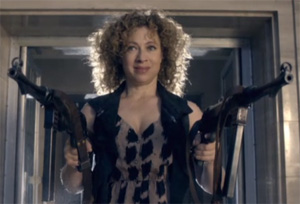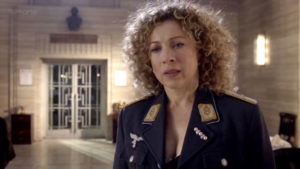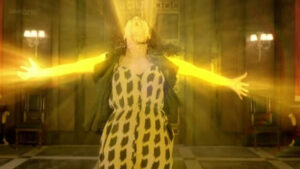Let’s Kill Hitler: A Defence & Analysis (Part 2)
Guest contributor Joshua Yetman revisits one of the revival’s most divisive episodes.

River herself, and her change of heart
Ah yes, River. She’s probably the most divisive aspect of this episode, which makes sense as she is essentially at the heart of this story. At the start of the episode, she’s a mad, fun psychopath, and at the end, she’s realised how wrong she was. And, of course, she also changes her face in this time as well. A significant jump then, but I feel people often overstate the jump in her character in this episode. It must be reiterated that she was not suddenly in love with the Doctor at the end (yes she kissed him, but it’s River…she’s hardly going to do things conventionally, is she?), but she simply comprehended and realised the lie she had been told all her life. But the jump in her attitude towards the Doctor, from killing him to saving him, makes perfect sense to me given what River found out.
Imagine, just for a moment, you were told that, in the future, you were going to fall in love with someone. That this someone would love you passionately. It’s not something directly relatable to us as we don’t have a mode of time travel, but here, River is given that knowledge exactly. How would you respond, given the fact that your future lover was in danger? The human reaction is obvious: you’d want to save them at all costs. Even if you don’t believe that the Doctor loved River (I personally do, but a lot of people seem to not think so), it’s what River was ultimately told, and Amy confirmed it. Some people say she was too quick to believe all this, too quick to believe the Doctor would be her future lover. But that also makes perfect sense as well, as she grow up with Amy and would trust her judgement that he was worth it, and River’s conditioning also seemed to put particular emphasis on Amy as well (the nursery in Greystark Halls having photos of her, among other things), so I think this attachment is very strong indeed.
 Going back to the original point, River was confronted with the fact that the Doctor would be her future lover, and, presented with all the evidence, this overcame her psychopathic conditioning, and she vowed to save him, as any one of us would, given the knowledge of who we would fall in love with. She saved the Doctor in a resolute way that never fails to bring tears to my eyes for how poignant it is (plus, the music used in this scene, “The Enigma of River Song”, is one of my all-time favourite Murray Gold tracks – it’s inconceivably beautiful).
Going back to the original point, River was confronted with the fact that the Doctor would be her future lover, and, presented with all the evidence, this overcame her psychopathic conditioning, and she vowed to save him, as any one of us would, given the knowledge of who we would fall in love with. She saved the Doctor in a resolute way that never fails to bring tears to my eyes for how poignant it is (plus, the music used in this scene, “The Enigma of River Song”, is one of my all-time favourite Murray Gold tracks – it’s inconceivably beautiful).
It may still seem too easy and quick to some, but, even before she met him, she had an incredible fascination with the man, asking Amy if “he was hot” and practically obsessing over the very concept of him whilst she was in the form of Mels. I feel that, because she was distanced from the Silence for so long, and the fact she grew up with Amy, some of her conditioning was weakened. I also feel that Amy, in the many years her and Mels grew up together, continuously highlighted the virtues of the Doctor (young Amy, after all, did idolise the man), and these factors passed over to the newly regenerated River (River admits herself she was impressionable at the time). She still was going to revert to her basic programming when she ultimately confronted him, but Amy’s influence made it easier to break. And, on top of all these justifications, you’ve also got to comprehend that River is a psychopath, and that her decisions are gonna be somewhat impulsive as a result.
 Alex Kingston gave an utterly breath-taking and highly convincing performance in this act of the story, clearly portraying River’s sheer doubt and confusion at the information being presented to her. You can almost see the conditioning disintegrating in her head, before the determination builds up, and she makes the ultimate decision to give up all of her regenerations and save the man that she will love.
Alex Kingston gave an utterly breath-taking and highly convincing performance in this act of the story, clearly portraying River’s sheer doubt and confusion at the information being presented to her. You can almost see the conditioning disintegrating in her head, before the determination builds up, and she makes the ultimate decision to give up all of her regenerations and save the man that she will love.
And I emphasise “will” in my previous sentence; I repeat that she wasn’t all suddenly in love with him at this point, she did it so she could have the opportunity to meet him in the future, and experience their love blossom first hand. Essentially, their entire relationship sits on one great big paradox, and I love it because of that, as it’s still presented so beautifully, but there’s a clever, Moffat-y twist as well. This is a personal preference, I admit; I tend to enjoy high concept romance over other kinds of romantic stories. These tales are so much more interesting than the bog-standard linear romances that we’re used to these days, I find.
Finally, I love how this story forms the perfect beginning of her story, with the gift of her blue diary, and her life – as we’ve seen it to date – stretched out before her. It truly complements every other appearance of River’s character and, if it wanted to be, it could have been the perfect ending for her character as well.
The only complaint I really have about River in this story is that, simply, I wanted to see more of ‘evil’ River, as she was just so much fun to witness!
For the other complaints this episode gets…
Here, I will quickly address some other common complaints this episode receives, starting with:
 “It’s a mess…”
“It’s a mess…”
Yes, the episode is a bit of a mess, and does juxtapose oddly with “A Good Man Goes to War”, but Moffat himself has admitted that he prefers to take a tangential direction with the second parts of the double-parters he writes (and Let’s Kill Hitler is, in many respects, the second part of a double-parter). Indeed, this philosophy seems set to influence a lot of Series 9 stories. But, regardless, I think the messiness of the script adds to the fun and entertainment factor, and I think it is deliberately intentional to make River seem more unhinged, and it complements her psychopathic conditioning. The second act then reels in the silliness and it takes a poignant turn, and River’s psychopathic tendencies similarly recede. It’s very artful, in that respect.
“River is at her worst…”
Yes, of course she’s at her worst. This is her at the very beginning, at her most vulnerable and confused and conflicted. And, personally, it was fun to see another side of her.
“Mels was shoehorned in…”
 Yes, this is one aspect of the story that even I was disappointed in. That said, I think Moffat did an admirable job in giving a background to Mels’ character in a very short amount of time, and gave an acceptable explanation as to why we hadn’t seen her to date, but I only wish Moffat had had a bit more foresight here. It would have been awesome to have her at the wedding in “The Big Bang” or just relaxing with Amy and Rory at the start of “The Impossible Astronaut”. But, as it is, I thought Mels was very enjoyable, but the short-lived nature of her appearance rather forced.
Yes, this is one aspect of the story that even I was disappointed in. That said, I think Moffat did an admirable job in giving a background to Mels’ character in a very short amount of time, and gave an acceptable explanation as to why we hadn’t seen her to date, but I only wish Moffat had had a bit more foresight here. It would have been awesome to have her at the wedding in “The Big Bang” or just relaxing with Amy and Rory at the start of “The Impossible Astronaut”. But, as it is, I thought Mels was very enjoyable, but the short-lived nature of her appearance rather forced.
Conclusion
Ultimately, I feel this is a story where a lot of people fail to comprehend the depth of the imagery, parallelisms and concepts that form its core. On the surface, it’s a wild romp culminating in a poignant conclusion, but underneath, it’s intelligent. Very intelligent, and remarkably profound. It forwards the arc, River’s character, and my love of this underrated series. Coupled with the sheer quality of the aforementioned humour, dialogue and Moffaty concepts (it’s clever, as I’ve said, but it’s brash elements are equally enjoyable), this truly is, in my opinion, one of the most underrated episodes of the revival.
Thank you for reading.








